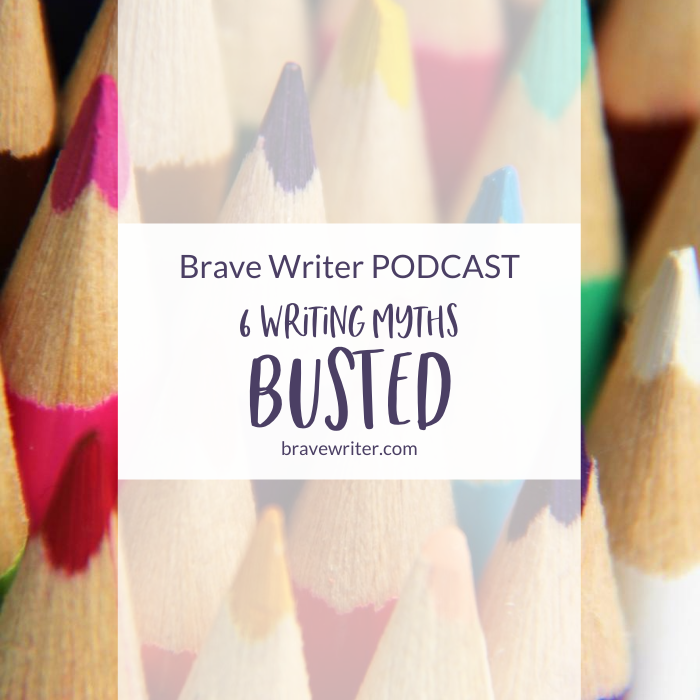Podcast: 6 Writing Myths Busted

Have you heard that to grow as a writer, you have to write every day?
Perhaps you’ve been told that for a child to write well and freely, that child needs to master spelling and punctuation first. Once that happens, the child will find writing easier.
How about this one? Children prefer writing from their imaginations than from facts.
These are three of the myths about writing I bust in this episode of the podcast. Tune in to hear why they’re myths AND to find out about the other three.
The 6 Writing Myths
- Mechanics first, writing second. Some educators and writing instructors talk about writing like it’s learning a foreign language or musical instrument; they assume that if a child has a good grasp on the mechanics, then they should inherently be able to write freely and easily. But writing is not made up of or dependent on mechanics like grammar and punctuation. Our children are already fluent in the English language and they have the writing impulse coursing through their bodies – they just don’t yet know how to transcribe it for themselves.
- Write every day. I bet you’ve heard this one before, haven’t you? It’s probably the most pervasive myth on this list, but it’s not great advice for everyone. Write every day if you are a professional writer. Write every day if you feel that writing is your vocation. But you do NOT have to write original, generative, from-scratch writing every day if you are just learning to write. However, you should ENGAGE with writing every day! So that might mean revision, copy work, reading, or even just exploring new ideas.
- Kids prefer imagination to facts in writing. We want our kids to have confidence in drawing on their own direct experience and their deepest vocabulary, and their best vocabulary will come from what they know really well – their personal experiences!
- The incremental approach through formats is a good strategy for writing education. This systematic approach may give you some comfort, and if that’s the case we won’t stop you, but it’s not the best way to teach good writing. Learning self-expression in writing has to start with your voice, not formats!
- Know your audience first. It’s good to know who you’re writing for… but do you really need to know it before you pick up the pen, especially as a new writer? Learn to write for yourself first, then decide who the audience is.
- If you hate writing, write more. If someone is struggling, they need support, they need a partner, they need an incentive to struggle, they need a context that is safe for risk-taking. So as you are preparing to write with a young person who you know hates it, consider what you can do to provide a little scaffolding. Make brownies, rub shoulders, write at the same time, let your child talk while you handwrite for them, play a game – anything you can do to move from “write more” to “let’s actually get some writing done.”
Your kids are brilliant, and they all have a writing voice inside of them. They just need a little help bringing it out!
Would you please post a review on Apple Podcasts for us?
Help a homeschooler like you find more joy in the journey. Thanks!


















